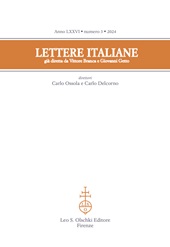Notte di luna piena "per la selva fonda": un'interpretazione di Inf. XX, 127-129
P. 373-388
Alla fine del canto infernale dei maghi e degl'indovini apprendiamo da Virgilio che quando Dante si trovò nella selva oscura fu luna piena, che però «non gli nocque », espressione spesso presa per una litote a significare 'gli giovò'. Ma all'inizio dell'Inferno non si fa alcun cenno al plenilunio: tale silenzio induce a credere che la luna piena non nocque, alla lettera, cioè non esercitò alcuna delle malie che la superstizione le imputava, volendo così Virgilio sfatare questa credenza come fa nello stesso xx canto con altre simili. L'inefficacia della luna (e del sole) nella selva oscura ha a che fare con la crisi delle istituzioni universali, Impero e Chiesa, rappresentate dai due astri maggiori.
Alla selva oscura, da cui inizia il viaggio guidato da Virgilio, corrisponde alla fine d'esso l'ombra perpetua della foresta edenica, che mai / raggiar non lascia Sole ivi né Luna, perché le due supreme autorità volute da Dio come rimedio al peccato originale non avrebbero ragion d'essere nel paradiso terrestre. [Testo dell'editore]
At the end of the infernal canto of the magicians and soothsayers we know from Virgil that when Dante found himself in the dark forest it was a full moon, which however non gli nocque, an expression often taken for a litotes to mean 'it benefited him'. But at the beginning of the Inferno there is no mention of the full moon: this silence leads us to believe that the full moon non nocque, literally, that is, it did not exercise any of the spells that superstition imputed to it, thus Virgil wanting to dispel this belief as he does in the same XX canto with other similar ones.
The ineffectiveness of the moon (and the sun) in the dark forest has to do with the crisis of the universal institutions, the Empire and the Church, represented by the two major celestial bodies. The dark forest, from which the journey guided by Virgil begins, corresponds at the end of it to the ombra perpetua of the Edenic forest, che mai / raggiar non lascia Sole ivi né Luna, because the two supreme authorities willed by God as a remedy for original sin would have no reason to exist in the earthly paradise. [Publisher's text]
58236 characters
Is part of
Lettere italiane : LXXVI, 3, 2024-
Articles from the same issue (available individually)
-
Information
DOI: 10.1400/300778
ISSN: 2035-6315


